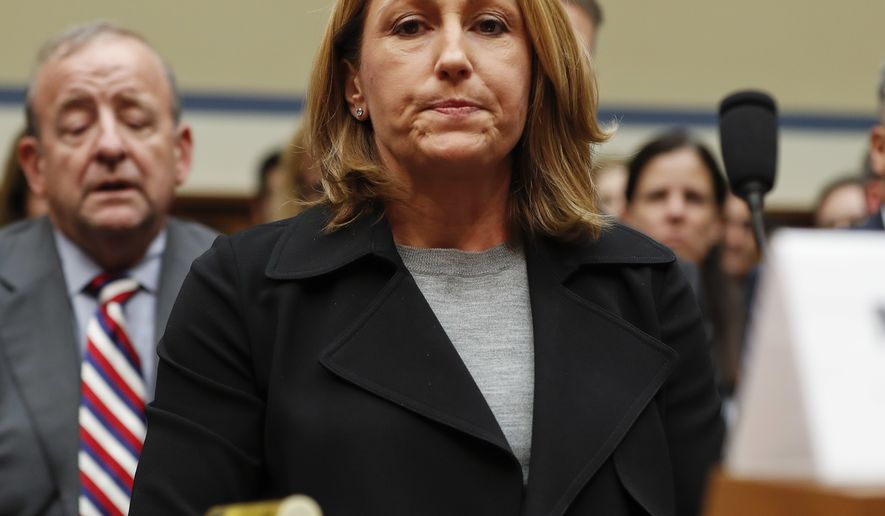The CEO of Mylan Pharmaceuticals defended the rising cost of her company’s lifesaving EpiPens to Congress on Wednesday, rejecting demands that she slash the price, though she insisted help is available for low-income patients and those with skimpy health care coverage.
Heather Bresch, daughter of Sen. Joe Manchin III, West Virginia Democrat, said only a fraction of Americans pay the full $608 list price.
Yet that price has risen by more than 500 percent since Mylan acquired the device in 2007, irking House investigators who said sharply rising drug costs are breaking the budgets of families, schools and taxpayer-funded programs alike, even as Mrs. Bresch earned $18 million last year.
“Sounds like you’re doing pretty well on this,” said Rep. John L. Mica, Florida Republican.
Mrs. Bresch said they raised prices to invest in improving the epinephrine injectors and make them more widely available. She said Mylan should have acted sooner, however, to ease the pain on patients whose high-deductible plans do not pick up the whole cost.
“I wish we had better anticipated the magnitude and acceleration of the rising financial issues for a growing minority of patients who may have ended up paying the full wholesale acquisition cost or more,” Mrs. Bresch told the House Oversight and Government Reform Committee. “We never intended this. We listened and focused on this issue and came up with an immediate and sustainable solution.”
The EpiPen brings quick relief to allergy sufferers who need them to stave off anaphylactic shock.
The price has been rising for years, but lawmakers only recently have begun to notice.
Earlier this year, Martin Shkreli, a former CEO of Turing Pharmaceuticals, enraged the committee by refusing to say why he raised the price of a decades-old drug more than fiftyfold.
Mrs. Bresch’s appearance before the House committee lacked that kind of drama, though the committee’s top Democrat issued a fiery condemnation of drug companies that have acquired older drugs and then hiked the cost.
“We’ve seen it over and over and over again,” said Rep. Elijah E. Cummings, calling out Mylan, Turing and Valeant Pharmaceuticals, which also faced Congress this year.
“They never, ever, ever lower their prices,” he said. “I’m concerned this is a rope-a-dope strategy.”
Committee Chairman Jason Chaffetz, Utah Republican, said companies are entitled to seek profits, though market forces aren’t working in this case as generics struggle to gain a foothold in the market for epinephrine injectors.
“If you don’t have it, you’re going to die, and there’s no competition,” Mr. Chaffetz said.
Mylan recently said it would offer direct assistance to people with high out-of-pocket costs while expanding its program for the uninsured and underinsured, so many more families would not have to pay anything for the EpiPens. It also said it would introduce a generic version at half the list price.
Douglas Throckmorton, deputy director at the Food and Drug Administration’s Center for Drug Evaluation and Research, testified that he is aware of the recent spike in prices for EpiPens — his son uses one — and that the agency is working to support generic competitors that could put downward pressure on costs.
Mylan piqued Congress’ ire on the cusp of the school year as parents made sure their children had the devices on hand. Many schools also stockpile the devices under 2013 legislation, signed by President Obama, that encourages the practice.
Rep. Mick Mulvaney, South Carolina Republican, said that’s the real reason Mrs. Bresch was called before Congress.
“You’ve lobbied us to make the taxpayer buy your stuff. … You asked for it,” he said.
In her opening statement, Mrs. Bresch said Mylan, located in the Netherlands for tax purposes but run from Canonsburg, Pennsylvania, nets only $100 of the $608 list price for each two-pack — or $50 per pen — after a Byzantine web of rebates, fees and material costs.
“Recent EpiPen price increases have not yielded the revenue to Mylan that many assume,” she testified.
Mr. Chaffetz offered little sympathy for Mylan’s bottom line, pointing to generous pay for Mylan’s executives.
“You have five executives, in five years, that earned nearly $300 million in compensation,” he said.
• Tom Howell Jr. can be reached at thowell@washingtontimes.com.




Please read our comment policy before commenting.